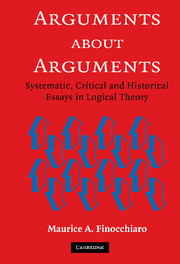Book contents
- Frontmatter
- Contents
- Preface and Acknowledgments
- Introduction : An Approach to a Branch of Logic
- Theorizing about reasoning and argument
- 1 Informal Logic and the Theory of Reasoning (1984)
- 2 An Historical Approach to the Study of Argumentation (1987)
- 3 Methodological Problems in Empirical Logic (1989)
- 4 Two Empirical Approaches to the Study of Reasoning (1994)
- 5 Critical Thinking, Critical Reasoning, and Methodological Reflection (1996)
- Fallacies and asymmetries
- Critiques
- Historical analyses
- Selected Bibliography
- Index
4 - Two Empirical Approaches to the Study of Reasoning (1994)
from Theorizing about reasoning and argument
Published online by Cambridge University Press: 05 February 2015
- Frontmatter
- Contents
- Preface and Acknowledgments
- Introduction : An Approach to a Branch of Logic
- Theorizing about reasoning and argument
- 1 Informal Logic and the Theory of Reasoning (1984)
- 2 An Historical Approach to the Study of Argumentation (1987)
- 3 Methodological Problems in Empirical Logic (1989)
- 4 Two Empirical Approaches to the Study of Reasoning (1994)
- 5 Critical Thinking, Critical Reasoning, and Methodological Reflection (1996)
- Fallacies and asymmetries
- Critiques
- Historical analyses
- Selected Bibliography
- Index
Summary
Introduction
In a number of papers I have advocated a type of empirical approach to the study of reasoning which may be called the historical-textual or informal-logic approach. Here reasoning is conceived as a special type of thinking which consists of interrelating thoughts in such a way that some are dependent on and follow from others. To this abstract definition one may add something of an operational definition by saying that reasoning occurs paradigmatically in written or oral discourse which contains a high incidence of reasoning indicator terms such as therefore, thus, hence, consequently, since, because, and for. What this means is that, while all reasoning is thinking, not all thinking is reasoning, and hence the study of reasoning is only a part of the study of mental and cognitive activities. I am not uninterested, of course, in the relationships between reasoning per se and thinking in general, but my own special focus is on the former.
In this context the empirical is contrasted primarily to the apriorist approach, in regard to which I would give the example that, if and to the extent that we regard formal logic as a theory of reasoning, it would be a type of apriorist approach. On the other hand, I do not mean to contrast the empirical to the normative, and in fact the aim of the historical-textual approach is the formulation of normative and evaluative principles besides descriptive, analytical, and explanatory ones.
- Type
- Chapter
- Information
- Arguments about ArgumentsSystematic, Critical, and Historical Essays In Logical Theory, pp. 65 - 91Publisher: Cambridge University PressPrint publication year: 2005



